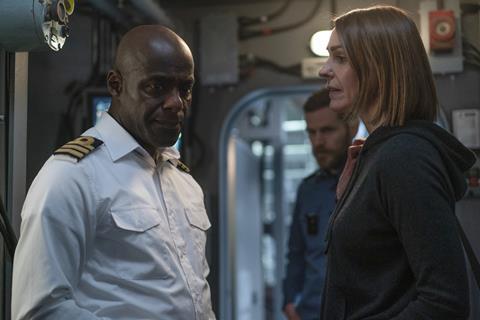“It’s a dense, sharply written, absolute treat of a show about a murky, unseen world that doesn’t want to break the surface and show itself, and one that viewers will surely want to dive into”

Vigil, BBC1
“The BBC’s new six-part drama has all the ingredients to be an absolute humdinger of a series, and it is. Claustrophobics beware, but anyone who can bring themselves to watch will have hours of solid, old-fashioned entertainment delivered unto them. It’s a dense, sharply written, absolute treat of a show about a murky, unseen world that doesn’t want to break the surface and show itself, and one that viewers will surely want to dive into.”
Lucy Mangan, The Guardian
“Scriptwriter Tom Edge has found a clever riff on the isolated murder-mystery conceit with Vigil, a beguiling and tense drama aboard a decidedly unmatey ship that will pleasingly play out in instalments Line of Duty-style. Edge packs in more dark politicking, corruption and secrets than there are bubbles floating up the Clyde too.”
Ben Dowell, The Times
“It has decent potential as a locked room mystery. The plot is tight and carries you along, provided you overlook a few illogicalities. You can imagine all this working pretty well as a Hollywood film, but it’s over-ambitious for TV – the CGI and sound dubbing can be obvious – and the sense of jeopardy that comes with a nuclear threat just isn’t there.”
Anita Singh, The Telegraph
“Vigil has everything it needs. The script, by Tom Edge, gets everything going at a brisk clip. The boat looks fantastic, more like a spaceship than the usual cramped tin can. The cast are solid throughout, especially Patterson Joseph, who sets himself up beautifully as the captain under pressure from forces both seen and invisible. If there’s a reason not to love Vigil, it’s that it all feels familiar. The plotting, the music, the rhythm and style of the direction: it all slips into gear too easily.”
Ed Cumming, The Independent
“The submarine’s labyrinthine claustrophobia was wielded to delightfully oppressive effect by the excellent cast and expert cinematography. Vigil’s first episode not only left me wanting to watch the second (showing on Monday night) but none the wiser as to where the series might stop off on its six-part journey.”
Emily Watkins, The i
Stephen, ITV
“Stephen folds the known facts and the known characters into a riveting story without letting the naturally more dramatic element of DCI Driscoll, as he hunts down new evidence and tightens the focus on the killers, overwhelm the infinitely harder work done by the unswerving, unflinching Lawrence parents.”
Lucy Mangan, The Guardian
“The writers treat the case with the respect it deserves, and don’t mess about giving Driscoll a troubled home life or a series of quirks or anything else that TV detectives are lumbered with in most crime dramas. Truly, Stephen is a testament to the fortitude of the Lawrences, and the determination of Clive Driscoll, to see this case through. The failings of the initial investigation are laid out for all to see.”
Anita Singh, The Telegraph
“Steve Coogan ably captured Driscoll’s sheer goodness and decency. Hugh Quarshie, beautifully reprising a role he played in Paul Greengrass’s acclaimed 1999 docudrama The Murder of Stephen Lawrence, conveyed Neville’s quiet anger and torment with skill and depth. As Doreen, Sharlene Whyte radiated dignity, stoicism and quiet fury, but also a wit and warmth that may not always have come across in the real woman’s many media appearances as a campaigner.”
Ben Dowell, The Times
“The producers have taken a back-to-basics approach to the new drama. Out has gone Greengrass’s heavyweight arthouse style, with its emphasis on hand-held verité. In come all the things that have been straightforwardly key to successful television detective dramas over the intervening years: painstaking procedural crime solving, emotional connection with all the principals, and star casting. The result is less an attention-grabbing Bafta bid, more unputdownable telly.”
Chris Harvey, The Independent
“The Lawrence family were curiously absent. Much of the episode was dedicated to Driscoll and his team, which may be because the drama is based on the detective’s memoir, In Pursuit of the Truth. The result was a curiously unemotional police procedural that could have been about any murder, rather than a significant death that changed how the UK thought about the police and race relations. So far, it feels less of a tribute to a young man taken long before his time and more like yet another ITV murder mystery.”
Emily Baker, The i
Surviving 9/11, BBC2
“Surviving 9/11 is profoundly moving throughout, without having to try very hard at it; testimony from the survivors is delivered plainly and sincerely. The filmmaking is extremely unshowy, wisely omitting a voiceover and cross-cutting effectively between multiple interviewees at a time. Filmmaker Arthur Cary has a good innate feel for which interviewees to spend the most time with, stringing together a narrative in a way that doesn’t feel forced.”
Louis Chilton, The Independent
“The film took a straightforward yet intensely personal view of the attack, interspersing familiar footage with interviews with survivors and family members of those who died. Love, loss, pain, hope and anger – the full spectrum of human emotion in a film that served as a reminder that life can be upended in the worst way possible.”
Emily Baker, The i
“Director Arthur Cary compiled a devastating collage of images and interviews with those who lived through the Twin Towers terrorist attack. Nothing more was needed than the heartfelt testimonies of people who lived through the atrocity and others still traumatised by bereavement. But flourishes were inserted anyway. The 90-minute film bears witness to a defining day in history. Before it is shown again, the makers should consider cutting out the ill-advised sequences that mar it so pointlessly.”
Christopher Stevens, Daily Mail
































No comments yet